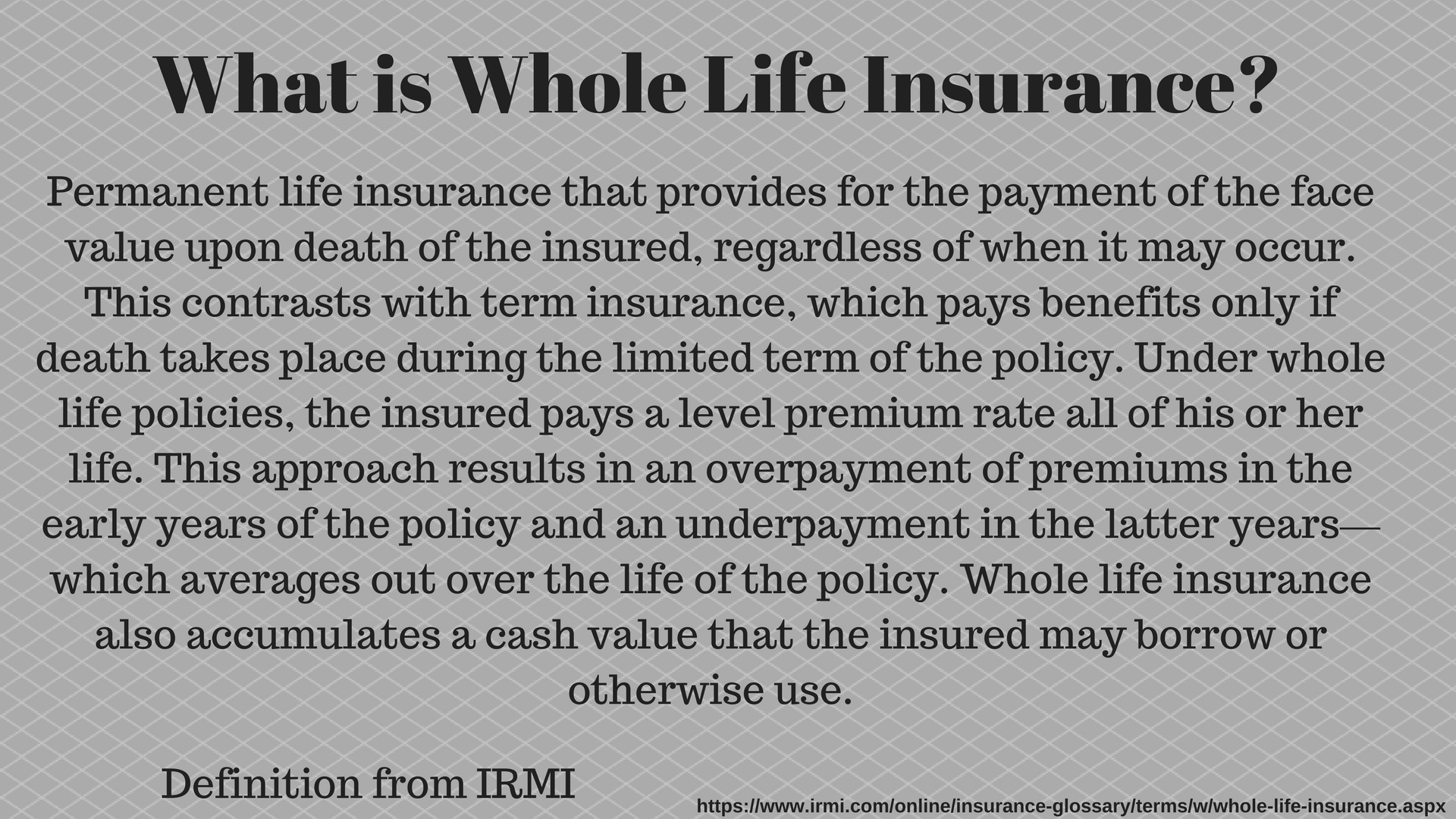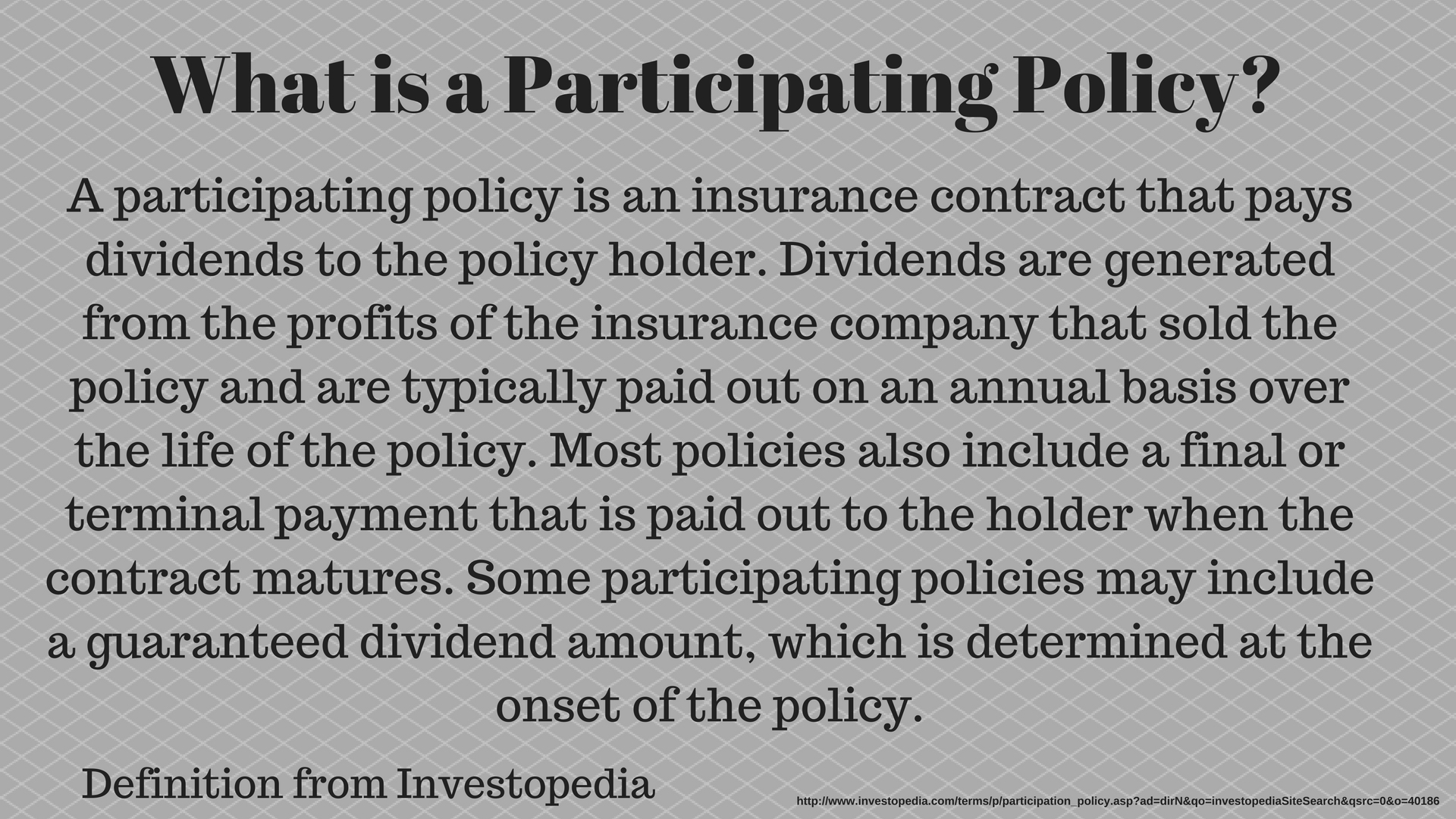Non Participating Whole life insurance is a non dividend permanent life insurance option for those wanting a lower cost policy choice. So called non par policies are simpler to select and have a lower hassle factor than their par brethren.
What is Non Participating Whole Life?
Non Participating life insurance is the opposite of Participating life insurance. With an absence of dividends and company ownership, these simplified whole life plans are typically less expensive and easier to select. Non par policies are usually sold by non mutual insurers. (However this is not always the case.)
Non participating whole life insurance also goes by the terms Non Par or Non Dividend paying Whole Life. As in a non par policy or a Non Dividend policy. We will use these abbreviation in this article. As in par policy vs a non par policy.
Non Participating Policies = No Dividends, Less Expensive, & Usually Issued by Non Mutuals
Participating Policies = Has Dividends, More Expensive, & Usually Issued by Mutuals
Before we discuss the participation of whole life insurance, lets briefly define whole life insurance.
What is Whole Life Insurance?
Whole life insurance is a type of cash value life insurance that lasts your entire life. "Permanent life insurance that provides for payment of the face value upon death of the insure, regardless of when it may occur....the Insured pays a level premium rate all of her or his life. This approach results in an over-payment of premiums in the early years...and underpayment in the latter years..."

Whole life insurance policies are famous for their ability to grow their cash value. Typically this is done by dividend payments. These dividend payments though are usually made through mutual insurers and through "participating" whole life contracts.
Participating and Non Participating:
Whole life insurance can be broken down into two categories:
The First Type of Whole LIfe Insurance - Participating Whole life
Participating whole life insurance is almost exclusively sold and issued by Mutual Life insurers. Mutual insurance companies are owned by their policy owners and they return their excess capital in the form of policy dividends. Policy dividends can be used in many different ways. One of the more popular ways is to use the policy dividends to purchase more life insurance.

Participating Whole Life Insurance = Potential Policy Dividends.
The First Type of Whole LIfe Insurance - Non- Participating Whole life
Non Participating whole life insurance is NOT owned by mutual insurers and typical policies DO not receive policy dividends. Although this may initially sound like bad news, it is not necessarily. If the insurer has a bad year, who cares. Since you are not "company owner" with a non-par policy there is nothing to concern yourself with.
In truth neither is simply better nor worse. It depends on what you want out of the whole life contract. Are you interested in spending less money or making a little bit of a return?
Non Participating Whole Life Insurance = No Policy Dividends.
Positives and Negatives of Non Participating Whole Life:
It is easy to assume that there are no positives to these policies, but that is distinctly not true. Non par policies have lots and lots of reasons that they can be beneficial for consumers.
Positives of Non Participating Policies:
Negatives of Non Participating Policies:
As you can see the biggest difference is going to be in the lower cost vs the ability to receive policy dividends. Other than that the biggest difference is more than likely the hassle factor when owning it and shopping for it. Whereas you may need to spend ten hours shopping for the best whole life insurance policy, a simple non participating policy may be had in just a few hours.
These multiple reasons that make non par policies a good consideration for some. Less Hassle and lower costs are two of the biggest reasons.
Best Candidates for Non Participating Whole Life:
Should you and your family consider a non par policy? Perhaps... Are you looking for the cheapest whole life insurance policy around? Do you think that you do not need the advantage of a potential par policy dividend on a yearly basis? Do you think that you will not need / want to raise the overall coverage amount? You might be a great candidate for a non participating contact.

Insurers that offer Non Participating Whole Life:
There is no complete list of insurance companies that offer non participating policies, but we can still try. Do the to several factors including the changing nature of insurer and the insurance / state issue there here are some of the non par insurance policies:
Foresters Financial Non Par Whole Life
Transamerica NON PAR WHOLE LIFE
Sagicore Sage Whole Life (Non Participating)
American International Group - AIG
Assurity Lifescape Simplified Whole life (non Participating)
Mutual Of Omaha NON PARTICIPATING WHOLE LIFE
Nationwide NON PARTICIPATING WHOLE LIFE
Gerber NON PARTICIPATING Whole Life
CINCINNATI LIfe NON PARTICIPATING Whole Life
AXA Interest sensitive WHole Life (NON PARTICIPATING)
*These are just some of the non par policies available, doubtless this list will change. It always does.
The Simple Alternative to Non Participating Whole Life Insurance:
It would be simple to just read this article here with no further "commentary." However, that is not often the way we write about insurance on this site. Non participating may be the best type and form of insurance for some. However its hard to see how its the best form of insurance for most.
In my "opinion" non participating whole life insurance is best offered to clients that truly want whole life insurance forever and do not seem to be able to save their money in other financial accounts. Or for those that do not qualify for term life insurance.
For most others its hard to see why non participating policies beat a Buy Term and Invest the Rest concept. A simple thirty year term policy can cost as little as 1/6 of a non par policy in certain situations. Level Term Life Insurance in combination with Qualified (such as a 401K) account is a winning combination for most.
What is buy term and invest the rest? Simple it involved buying long term term life insurance policies and putting the residual savings into qualified savings accounts. A qualified savings account are accounts such as 401Ks and Roth IRAs, among numerous others.
Questions on Non Participating Whole Life:
Feel free to send us your questions about these somewhat forgotten options. We will happily answer any and all questions that you have.
Question: Are Non Participating Life Insurance policies good?
Answer: Non Par policies are neither good nor bad, they just are. There are numerous benefits to these policies including less hassle when purchasing, and a somewhat overall lower cost. That being said often buying term can still be a better choice for many.
Question: I was told that Non Par policies are a rip off, is this true?
Answer: Non participating policies are not necessarily a rip off. They may not be the best type of insurance for you and your family and hence might not be a good use of money. For an elite few, participating whole life insurance could be a better consideration.
Thanks for reading.



 Speak with an experienced advisor!
Speak with an experienced advisor! 
